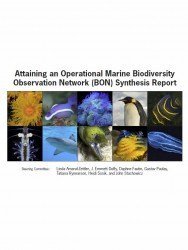Interagency Working Group on Ocean Partnership’s Attaining an Operational Marine Biodiversity Observation Network Report Released

Committee Part of the National Oceanographic Partnership Program
Washington, DC – The National Oceanographic Partnership Program (NOPP) today announced the release of the Attaining an Operational Marine Biodiversity Observation Network Synthesis Report. The report is the result of a three-day workshop held at the Consortium for Ocean Leadership to plan for the implementation of a sustainable marine Biodiversity Observing Network (BON).
Currently, there is no standardized, coordinated approach to monitoring marine biodiversity, the degree of variation in marine life forms. According the Interagency Working Group on Ocean Partnerships (IWG-OP), maintenance of marine biodiversity may be a key factor for sustained ecosystem health, which humans depend on daily for food and jobs.
Thirty-five scientists and 13 representatives of seven federal agency sponsors (NOAA, NASA, MMC, ONR, NSF, BOEMRE, and the Smithsonian Institution) met in May 2010 to discuss the overarching components of BON, which culminated into the pioneering Attaining an Operational Marine Biodiversity Observation Network Synthesis Report.
The report provides a set of recommendations and case studies for implementing a national and global marine BON. The following recommendations were developed by seven steering committee members (Linda Amaral-Zettler, Marine Biological Laboratory; J. Emmett Duffy, Virginia Institute of Marine Science; Daphne Fautin, University of Kansas; Gustav Paulay, University of Florida; Tatiana Rynearson, University of Rhode Island; Heidi Sosik, Woods Hole Oceanographic Institution; and John Stachowicz, University of California-Davis) based on discussions among workshop participants:
1. Coordinate biodiversity sampling across taxa, habitats, hierarchical levels, and methods from microbes to mammals;
2. Maximize compatibility of BON with legacy data;
3. Establish one or more Biodiversity Observation Center(s) to coordinate sample processing, including taxonomic identifications, data management, and training and invest in the computational expertise to handle large datasets in an open access environment;
4. Synthesize and make accessible marine taxonomic resources;
5. Invest in developing new approaches for automated sample processing;
6. Modernize and enhance the nation’s physical infrastructure for marine exploration; and
7. Initiate an integrated marine BON demonstration project soon.
“The workshop participants found no technology hurdles to achieving a marine biodiversity observing network that will monitor status and trends of living marine resources and help to secure the vital ecosystem services they provide,” said Reginald Beach, Ph.D., senior scientist at NOAA Office of Ocean Exploration and Research. “I believe the best way to organize and implement that network is through partnerships and I look forward to supporting those efforts.”
The entire synthesis report is available here. If you would like a hard copy of the report, please email your request and address to noppo@oceanleadership.org.
For more information on NOPP, visit the program’s website.
-###-
About Consortium for Ocean Leadership
Ocean Leadership is a Washington, D.C.-based nonprofit organization that represents 96 of the leading public and private ocean research education institutions, aquaria and industry with the mission to advance research, education and sound ocean policy. The organization also manages ocean research and education programs in areas of scientific ocean drilling, ocean observing, ocean exploration and ocean partnerships.
About National Oceanographic Partnership Program
The National Oceanographic Partnership Program (NOPP) is a program of the Consortium for Ocean Leadership. NOPP facilitates collaborations between federal agencies to identify and fund scientific partnerships among academia, government, industry and other members of the ocean science community. These partnerships have strengthened and expanded oceanographic research for more than a decade.
Media Contact:
Kristin Mellon
202-787-1644
kmellon@oceanleadership.org


